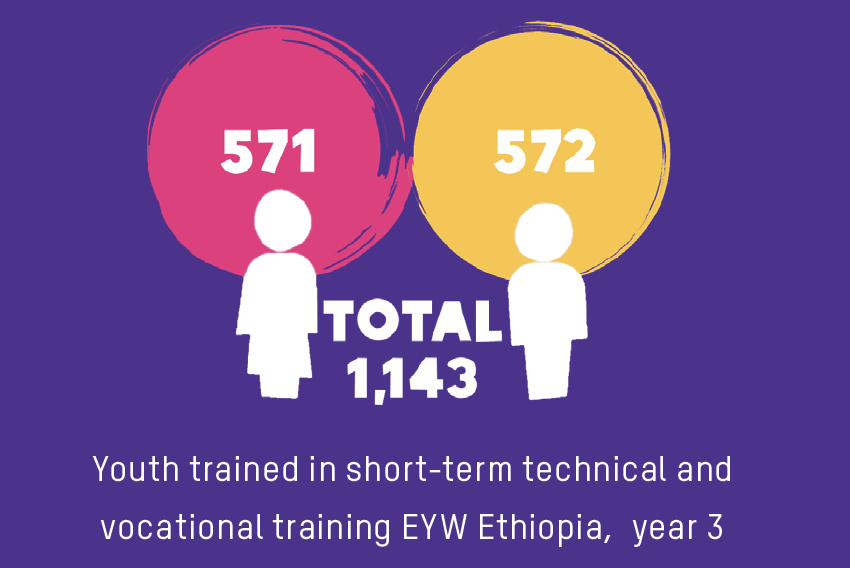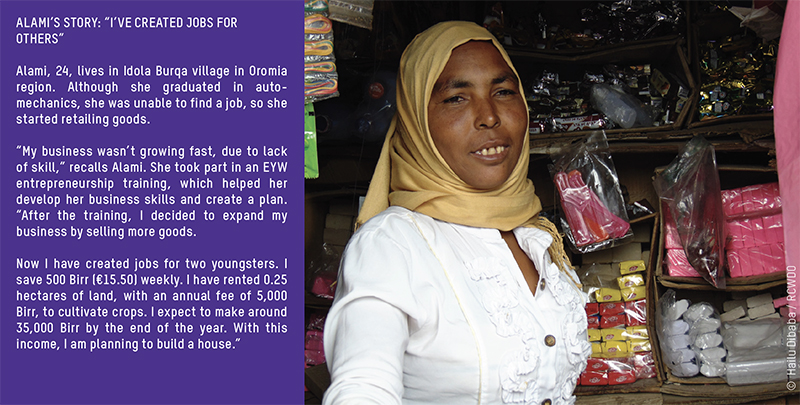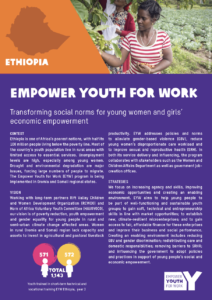Ethiopia year 3 overview
The third year of the project Empower Youth for Work in Ethiopia has focused Business Development Services, providing youth groups with a Loan Guarantee Fund and on working on an enabling environment by for example community conversations and radio shows.
Key achievements
Major achievements of the EYW program in Ethiopia during year 3 include identifying, organizing and strengthening youth groups, providing them with a Loan Guarantee Fund (LGF) and conventional Business Development Services (BDS), as well as business management, leadership and soft skills training, which has reached more than 8,000 youth (almost 50% female). As the recent midline report indicates, young people in the target districts confirmed that the soft skills components of the training, among others, were useful in their daily lives. The program has linked youth start-ups to microfinance institutions which have granted them around 7.3 million Birr in loans.
As part of the program’s efforts to create an enabling environment for young people’s economic empowerment, we printed and distributed more than 3,000 copies of training materials among beneficiaries, community leaders and participants of international observances. During year 3, more than 2,287 (1,245 female) young people took part in bi-monthly Community Conversations on GBV, SRHR and unpaid care work. School clubs were strengthened to raise school communities’ awareness on these issues, 735 (395 female) students are now regularly participating in the school clubs. Weekly radio shows also play an important role in EYW’s work to create an enabling environment, through regular transmissions with full geographical coverage of the target regions. The radio shows raise awareness by running features or holding discussions on SRHR, GBV and care-work distribution, and celebrating events such as International Women’s Day.

Innovation and pilots
The EYW program’s innovative approach is manifested mainly in the LGF scheme, mobile BDS, a youth apprenticeship scheme and the development of youth-friendly training modules to overcome inaccessibility of financial, business and similar services. The BDS vehicle is designed to bring business solutions direct to rural youth in hard-to-reach locations. Comprehensive and conventional BDS materials have been prepared and provided in local languages covering soft and entrepreneurship skills. In a bid to help youth start-ups boost their businesses, EYW organized training sessions that brought together a range of experts from different institutions. This helped the program to ensure 70% female participation by easing the challenges young women face in moving from place to place for education, training and employment.

Challenges and risks
The program faced a number of risks and challenges to implementation in its third year. These included youth migration, lack of commitment among target youth, and negative experiences of some youth start-ups including price inflation, lack of financial capacity to sustain the business and insufficient stakeholder support/commitment. Measures taken to address these risks include revision of business plans, reorganizing the groups in line with EYW’s 70/30 gender composition ambition, and providing business start-ups with follow-up assistance, including on-the-spot technical support, until the business has been established and group solidarity has been created.
Year 3 overview in PDF:

